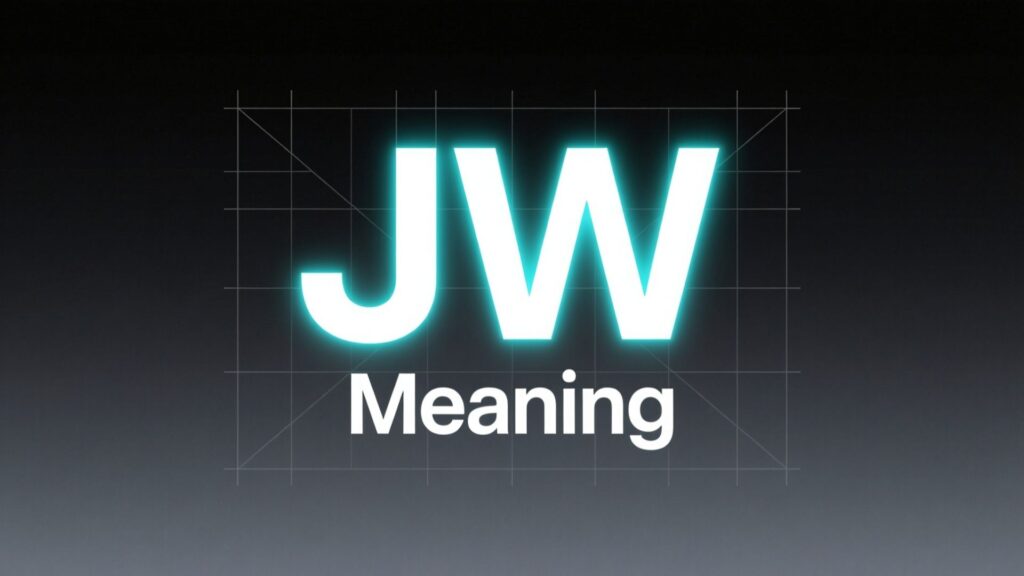Digital chat is peppered with acronyms and abbreviations. One of the more curious ones you’ll see is “JW.” You might pause and ask: What does JW mean in text? Or What is JW in text? In this post, you’ll get a full breakdown of jw meaning in text, how people use jw in text, plus when it’s smart (or unwise) to drop it into your messages.
Why Understanding “JW” Matters in Communication

“JW” isn’t just another slang term. The tone, nuance, and clarity of your message often hinge on small choices like this. Misunderstanding what does jw mean on text can lead to confusion, awkwardness, or misinterpretation.
Here’s why this matters:
- It shapes tone. A message beginning “JW…” comes off softer or less aggressive.
- It signals intent. You’re hinting you’re curious, not demanding.
- It affects clarity. Some readers may not know the meaning and misread your text.
- It’s contextual. What “JW” means in a group chat could differ from a work email.
Whether you’re texting a friend, DMing someone new, or sending a message to a coworker, knowing what does jw mean in text helps you avoid tone misfires and communicate more clearly.
What “JW” Actually Means in Text and Chat
At its core: “JW” stands for “Just Wondering.”
But there’s nuance behind that simple expansion.
Definition and Core Meaning
- Just Wondering is the direct meaning used in texting and internet chats.
- It functions as a leading phrase. Writers use it before a question (or after) to soften the question’s force.
- It suggests curiosity rather than demand.
Sometimes, “JW” may carry an alternate meaning: Jehovah’s Witness particularly in religious contexts. But that meaning is fairly domain-specific, not typical in casual texting.
Tone, Intent, and Variation
The tone you convey with jw in text depends heavily on:
- Context Who you’re speaking to (a friend vs. a boss), and where (chat vs. email).
- Punctuation and format “JW” alone vs. “JW, are you free tomorrow?”
- Pairing words Sometimes it precedes questions: “JW, did you see that?”
- Case & stylization You’ll see “jw,” “JW,” or “j/w” in different chats.
Because of those factors, the same message can feel casual, polite, or even passive-aggressive depending on context.
The Real Purpose Behind “JW” – It’s Not Just Curiosity
Why do people actually use “JW”? It’s more than laziness or shorthand. Understanding that helps you decide when and how to use it.
Softening the Ask
“JW” acts as a buffer. If you lead with “JW,” the question feels less blunt:
“JW, did you get my email?”
vs
“Did you get my email?”
The first feels less anxious and more conversational.
Reducing Pressure
You signal: “I’m not demanding an immediate response,” which lowers pressure on the recipient. That can be helpful when asking something you’re unsure about.
Showing Politeness or Indirectness
Sometimes, you don’t want to seem pushy. “JW” lets you ask something indirectly. In cultures or relationships where directness feels rude, “JW” gives you wiggle room.
Managing Social Risk
When you’re unsure about boundaries (e.g. texting someone you don’t know well), “JW” provides a kind of shield: “I’m only asking casually, not intruding.”
Common Scenarios Where “JW” Appears
Let’s dig into real contexts where people use jw meaning in text, and how interpretation shifts.
| Scenario | Example | Effect / Interpretation |
|---|---|---|
| Among friends | “JW, are you coming to dinner?” | Casual curiosity |
| In DM / influencer chat | “JW, do you do coaching?” | Soft intro, less aggressive |
| Work chat / Slack | “JW if you need my input” | Slightly casual, but acceptable in many settings |
| Group chat | “JW, who’s doing the ride share?” | Lightweight, non-demanding |
| Email / formal context | “JW about the next meeting time” | Risky may feel unprofessional |
| Online forum | “JW what people think of this idea” | Common usage in discussion threads |
“I just threw in ‘JW’ before asking wanted to sound casual, not bossy.” common sentiment about using jw in text
On Snapchat and other social apps, people often use JW when they have a question but don’t want to sound demanding. It’s not limited to texting you’ll see it on Instagram, Twitter DMs, and Discord too.
When You Shouldn’t Use “JW”
While jw meaning in text has its uses, sometimes it backfires. Here are situations where you should avoid it.
Overuse Makes It Tame
If every message starts with “JW,” you dilute the phrase’s effect. People might start ignoring it.
When Clarity Must Come First
If you need a direct answer (e.g. for deadlines, safety, emergencies), drop the buffer. Say what you need.
In Formal or Professional Communication
Using “JW” in emails to clients, supervisors, or stakeholders can seem unprofessional or lazy.
When It Might Sound Passive-Aggressive
Without tone indicators (emoji, pauses, context), “JW” might feel sarcastic or grating:
“JW, why didn’t you invite me?”
This can come off as a jab.
Case Study: Miscommunication with “JW”
Scenario:
Alice texts Bob: “JW, why didn’t you respond earlier?”
Bob reads it as confrontational, replies defensively.
Better alternative:
“Alice: I was just curious did you see my earlier message?”
In the first, the “JW” carries tension. In the second, you communicate curiosity more gently.
15 Alternatives to “JW – With Usage and Tone Explained
Below are alternatives to “JW” (just wondering). I group them by tone type to help you choose wisely.
Friendly & Casual Alternatives
- I was just curious…
- Out of curiosity…
- Just wanted to ask…
- Mind if I ask…
- I’m interested to know…
Neutral & Polite Alternatives
- I was wondering…
- Would you happen to know…
- Could you let me know…
- Do you know if…
- Is there any update on…
Respectful & Formal Alternatives
- If you don’t mind me asking…
- Would it be alright if I asked…
- I hope it’s okay to ask…
- Just checking in to see…
- Could I ask something, if that’s alright?
| Phrase | Tone | Best Use Case |
|---|---|---|
| I was just curious… | Casual, friendly | Texting friends |
| I was wondering… | Neutral | Chatting with acquaintances |
| Could you let me know… | Polite, direct | Work or formal messaging |
| If you don’t mind me asking… | Respectful | Conversations with seniors or clients |
| Just checking in to see… | Soft, diplomatic | Follow-ups or gentle reminders |
These options help you avoid overusing jw in text while still maintaining tone and clarity.
Choosing the Right Alternative: 3 Golden Rules

Selecting which phrase to use isn’t random. Use these rules to pick the best alternative.
Match Tone to Relationship
Talk differently to a best friend than to your manager. Use casual alternatives with peers, and more formal ones with people you don’t know well.
Adjust for Formality & Context
In a company email, “Could you let me know…” suits better than “JW.” In DMs, “JW” or “I was just curious…” feels better.
Be Clear With Intent
If you want a direct answer, don’t cushion too much. If you’re asking to fish for info, softer phrasing works. Always aim for your intent to shine through.
Example Comparisons
- With a friend: “I was just curious want to hang out?”
- With a manager: “Could you let me know your availability next week?”
- With a professor: “If you don’t mind me asking, will there be extra credit?”
Advanced Tips to Communicate Better in Text
To go beyond just “JW vs alternatives,” here are more insights to write texts that land well.
Use Punctuation & Emojis Wisely
A “?” or “🙂” can soften or change tone dramatically.
- “JW, are you okay?”
- “JW, are you okay? 🙂”
The emoji can turn it into a gentler check-in.
Be Intentional With Brevity
Short messages feel snappier, but they also risk sounding curt. Adding just one word like “please” or “thanks” can help.
Always Preview How It Reads
Before sending, read what does jw mean on text from the recipient’s view. Does it feel friendly, nervous, or abrupt?
Use Context Clues
Mention previous messages or shared context:
“Hey, JW, did you see the link I sent last night?”
This reduces ambiguity around what is jw in text.
Real-Life Examples: “JW” vs. Better Alternatives
Let’s compare actual messages to see how tone shifts.
Example 1 Friend Group Chat
- With JW: “JW, who wants to meet Saturday?”
- Alternative: “Just wanted to ask who’s free Saturday?”
Example 2 Colleague to Colleague
- With JW: “JW if you got my doc.”
- Alternative: “Could you let me know if you received my document?”
Example 3 DM to Influencer / Creator
- With JW: “JW, do you sell merch?”
- Alternative: “I was wondering if you sell any merch.”
Expert Insights: Why “JW” Persists in Digital Language
Why has jw meaning in text endured across platforms? Let’s look at sociolinguistics and evolving texting culture.
Efficiency & Brevity
In fast chats, every character counts. “Just wondering” is long; “JW” saves keystrokes and feels casual.
Politeness Strategy
Linguists call “JW” a mitigation device a way to soften an utterance, reduce face threat, and ease social friction.
Digital Norms & Generational Influence
Texting conventions change rapidly. Gen Z and Millennials often default to abbreviations. “JW” is part of that evolving shorthand.
Also, cultural norms around indirectness (in some societies) encourage phrases that don’t force pressure. “JW” works well in those contexts.
Quick Reference Guide: When to Use, Avoid, or Replace “JW”
| Situation | Use “JW”? | Better Approach | Reason |
|---|---|---|---|
| Chat with close friends | ✅ | — | Casual tone is fine |
| Asking a boss or client | ❌ | “Could you let me know…” | More professional |
| Group chat with peers | ✅ | — | Acceptable tone |
| Formal email or proposal | ❌ | Skip “JW” altogether | Maintain professionalism |
| Sensitive topic (health, finances) | ❌ | Use direct yet gentle phrasing | Reduces misinterpretation |
Summary: Key Takeaways
- “JW” means “Just Wondering.” It’s shorthand used to make questions feel softer.
- Tone and context are everything the same “JW” can read differently depending on who you speak to.
- Avoid jw in text when clarity, formality, or professionalism matters.
- Use the 15 alternatives above match your phrase to the relationship and situation.
- Preview messages before you send, use context clues, and be intentional about how soft or direct you need to sound.
Related Slang Meanings (For Cross-Reference)
If you’re curious about other slang like JSP or ASF, here are quick references to check out:
- JSP Meaning in Text What It Really Stands For
- ASF Meaning in Text What It Means and How to Use It Safely
- TBH Meaning in Text When to Use It Honestly
These cross-references help build your slang vocabulary and strengthen your writing’s SEO footprint.
Conclusion: Speak Clearly, Even When You’re “Just Wondering”
Even a short phrase like “JW” carries weight. When used well, it softens your ask, feels casual, and avoids coming across as pushy. When misused, it can breed confusion or unintended annoyance.
Whether you’re texting a friend, emailing a coworker, or sending a DM, take a moment to think: Will “JW” help or hurt my message? Use it when it fits and when it doesn’t, pick one of the alternatives above. That way, you stay polite, clear, and confident in your communication.
Bugti is the founder of Quoethint.com, a hub for English language tips, writing advice, and grammar guidance. With years of experience in English studies and a passion for clear communication, Bugti created this platform to make grammar and writing easy to understand for everyone.
